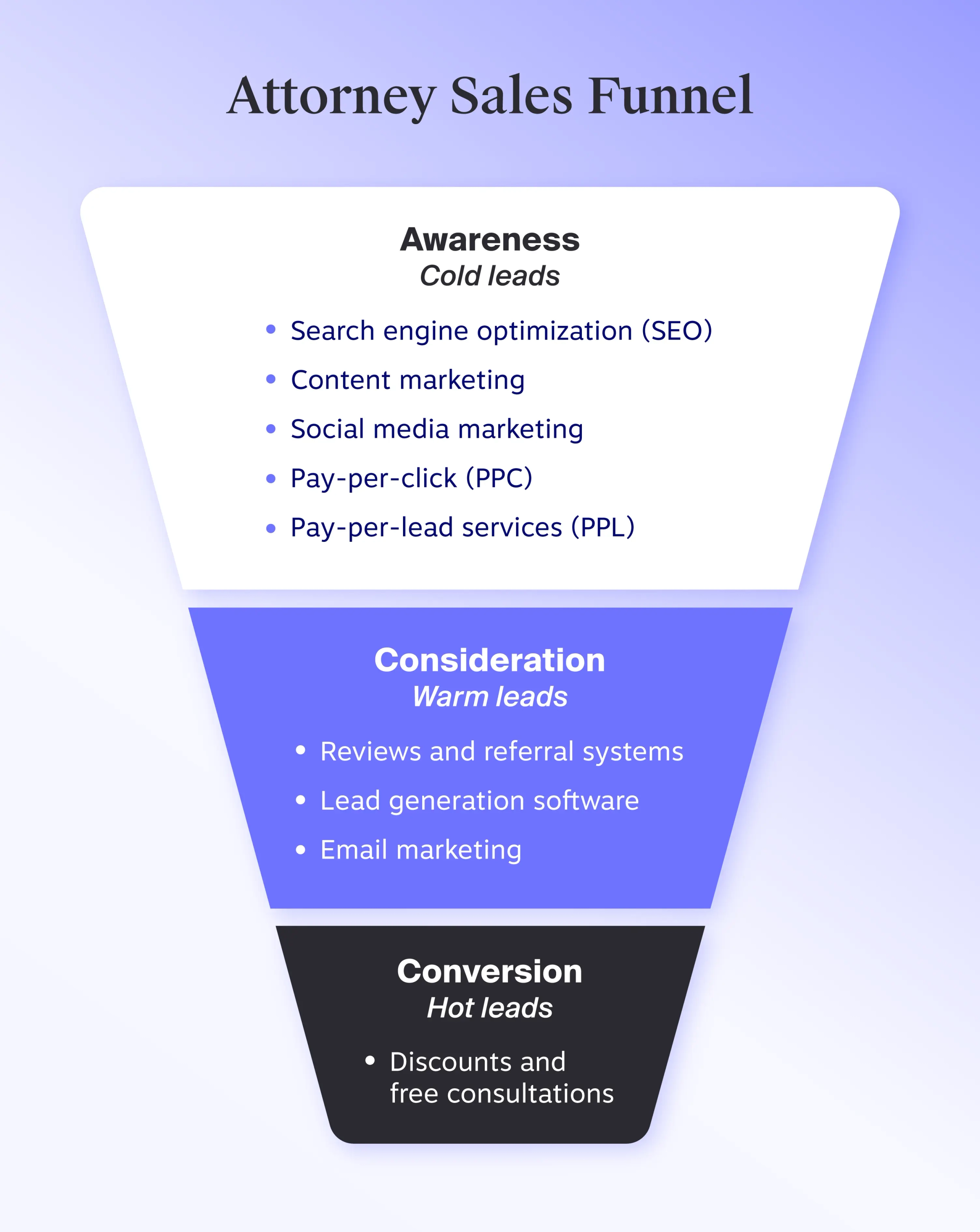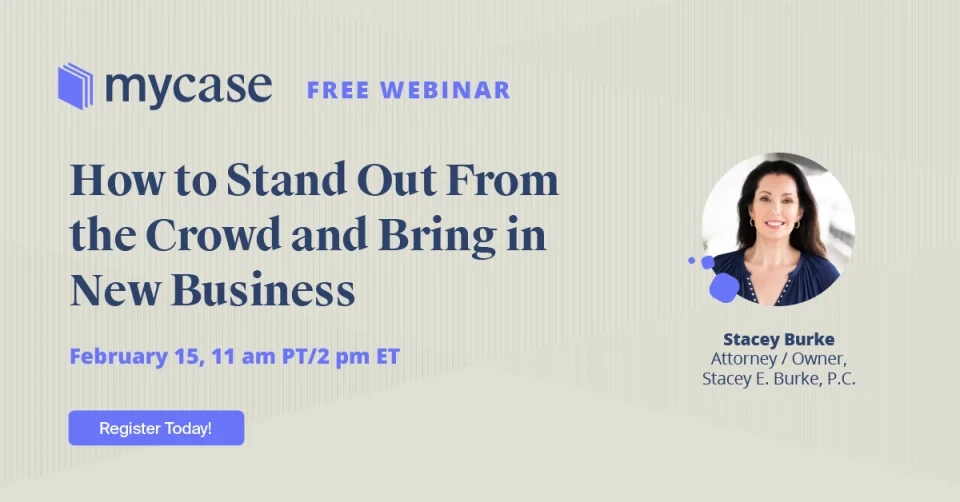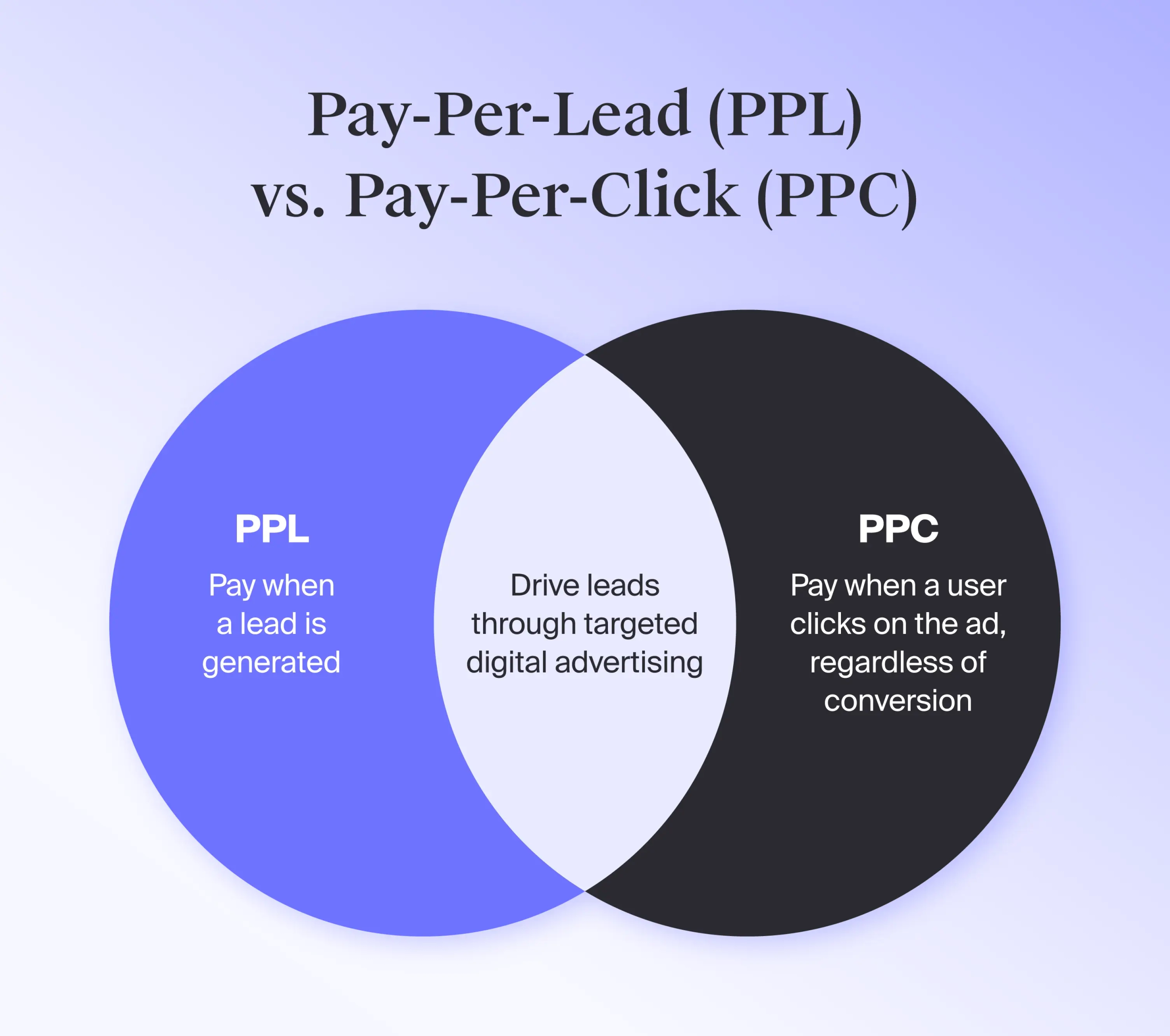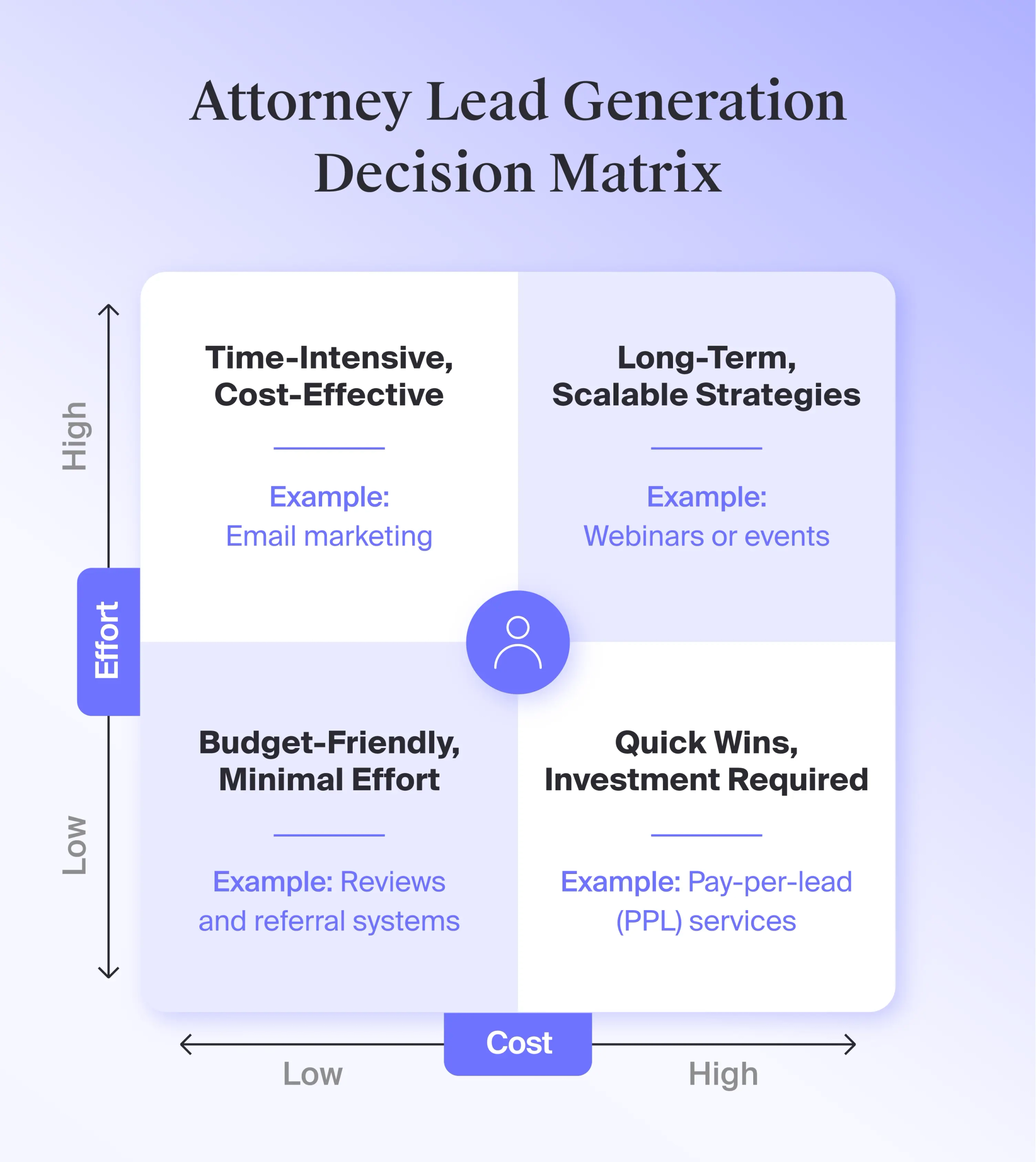Key takeaways
Attorney lead generation is a process that helps lawyers create interest in their services by attracting potential clients. Engaging in lead generation can help boost case volume, profitability, and long-term law firm growth.
Like most other professionals, attorneys need a constant stream of law firm leads to generate income. They do this through attorney lead generation—a digital marketing technique that leads a potential client to contact a lawyer for services. While word of mouth and client referrals are excellent ways to obtain new clientele, attorney lead generation is a viable, cost-effective marketing strategy that can help increase client prospects and conversions.
For example, a recent 2024 Legal Industry Report study revealed that firms that used MyCase’s lead capture form saw an 18% lead conversion rate.
In this article, we’ll provide a general overview of lead generation, how law firms can generate leads, and the most common lead generation methods for lawyers.
What Is Lead Generation for Lawyers?
Lead generation for lawyers is the process of attracting prospective clients—also called “leads.” This includes a range of people, including anyone who visits your website through an ad or calls for a free consultation.
When clients first become interested in a law firm, they are at the top of the sales funnel. Attorney lead generation strategies aim to get more potential clients through the top and middle funnels to eventually convert into actual clients at the bottom.
Here’s more detail about law firm leads and where they fall in different parts of the sales funnel:
Cold leads: These leads, located at the top of the sales funnel, have casual awareness of your firm but aren’t quite ready to become clients.
Warm leads: These leads are in the middle of the sales funnel. They know about your firm and what it offers but aren’t quite ready to become clients yet.
Hot leads: These leads are at the bottom of the sales funnel, ready to make a purchase or sign up for a service.

How To Generate Leads for Your Law Firm
Before engaging in formal law firm lead generation techniques, your firm will need to put a few key components in place. For example:
Is your website fully operational? A website with 404 pages, broken links, and “coming soon” messages will not leave a positive impression on potential clients.
Do you have quality website content? Content marketing is a crucial part of proper legal lead generation. It can enhance your site’s search engine optimization (SEO) and establish your authority in the legal space.
Do you have a call to action (CTA) on your page? Clients need to be incentivized to contact an attorney. For example, in your website’s navigation, you can include a CTA to schedule a free consultation. Including this in a prominent location can encourage more users to reach out.
Do you have a landing page where potential clients can input their information? You can't follow up with a warm lead who visits your website without having a space for them to input their name, email address, and phone number.

9 Lawyer Lead Generation Methods
The most popular, strategic, and cost-effective attorney lead generation methods include but aren’t limited to SEO, content marketing, social media marketing, pay-per-lead (PPL) services, pay-per-click (PPC) services, email marketing, and review services.
Let’s look at how these methods can assist with lead generation for attorneys.
1. Search Engine Optimization
One of the most effective methods of law firm digital marketing is search engine optimization. Essentially, SEO helps search engines (such as Google) better understand your content. Quality, authoritative content is driven to the top of search engine results, while low-quality content moves to the bottom.
SEO best practices will help your firm reach the first page of Google, which can improve your odds of securing lead generation.
But SEO isn’t just about creating good content for your site. To fully optimize your site’s SEO, you’ll need to ensure that your site’s technical SEO (which involves link building, 301 redirects, and more) and on-page SEO (which involves title tags, URLs, keywords, and more) are also optimal.
2. Content Marketing
Content marketing is a type of digital marketing that uses blogs and videos to stimulate interest in a company’s goods or services. Content marketing doesn’t explicitly promote the company as a provider of those goods or services, however, so it’s a very subtle way of promoting a business.
In the legal world, attorneys can grow their client base by using content marketing for law firm websites to build brand awareness, increase business exposure, and generate more leads. This can include creating informational content around common questions that clients ask, concepts related to a firm’s practice area, and other topics that may attract potential clients.
3. Social Media Marketing
Law firm social media marketing is an effective way to engage in lead generation for law firms.
By using appropriate social media platforms—such as LinkedIn—to connect with potential clients, attorneys can position themselves as experts in their field. They can also keep abreast of legal trends in their community, connect with other attorneys for additional leads, and even generate some publicity for themselves and their firm.
Lawyers can get started by sharing their thoughts on relevant law changes for their practice area, sharing tips, and commenting on and sharing relevant content.
4. Pay-Per-Lead (PPL) Services
Not all attorneys have sizable promotional budgets for law firm advertising. PPL services are an affordable yet effective lead-generation solution for smaller law firms or firms with budget constraints.
A law firm that uses a PPL model only pays for leads generated through the service. Most PPL-generated leads come from online forms, discount services, and subscription models.
5. Pay-Per-Click (PPC) Services
Unlike PPL services, where the attorney only pays if the service generates a lead, pay-per-click services involve a lawyer paying a publisher when somebody clicks an ad.
The publisher can be a search engine such as Google, a website owner, or the owner of a network of several websites. PPC ads can especially increase visibility on search engines, since a law firm’s website can appear in paid ads and organic search results.

6. Email Marketing
Email marketing uses email to promote goods or services to those who sign up for a mailing list. In addition to enhancing current client engagement and communication, email marketing can boost client referrals and provide a great return on investment (ROI).
There are several ways to approach email marketing. For example, you can use it to share informational blog posts you’ve written. You can also invite clients to upcoming webinars or events.
You can also use email to nurture warm leads. For instance, if you have a customer relationship management (CRM) platform, you can export your warm leads’ contact information to create an email list. Then, you can begin sending them a targeted email nurture campaign.
The sequence may look like this:
First email: Welcome message thanking them for connecting with you and providing a free valuable resource, like a checklist or guide
Next email(s): Informational message educating them about your law firm’s expertise with a call to action to visit your website
Last email: Invitation to schedule a consultation to discuss their legal needs
7. Reviews and Referrals
Building trust is essential to converting potential clients. Positive online reviews help establish rapport by showcasing your law firm’s authenticity and reliability.
Reviews also give firms an SEO boost, especially if you or someone in your firm engages with the reviews. A response as simple as “Thanks for your support! We appreciated working with you!” can count as a user interaction and potentially improve rankings. Sharing a quick “thank you” also shows potential leads how much you care about your current clients.
Referral systems take reviews one step further. In addition to sharing a positive review, some clients may want to recommend others to you in the future.
To begin actively seeking referrals, you can simply start by asking your current clients. You can also add a form on your website or in their client portal to streamline the process for them.

8. Discounted or Free Consultations
It’s not unusual for attorneys to offer discounted and free consultations to prospective clients. These consultations allow attorneys to determine whether the case is viable and, if it is, whether it’s a good fit for the firm.
Free and discounted consultations also serve as a form of legal lead generation—since they encourage potential clients to reach out without worrying about the cost.
9. Lead Generation Software
Lead generation software, although technically not a standalone lead generation method, can help streamline the process of nurturing and capturing leads. It’s also a broad category that can encompass many features and tools.
For example, MyCase’s CRM software lets lawyers create online lead forms to easily capture lead information directly on their sites.
Why Lead Generation for Law Firms Is Important
Targeted lead generation is helpful for attracting the most relevant leads, maximizing efficiency, and ensuring ongoing and sustainable growth.
Relevant leads: Targeted lead generation focuses on attracting potential clients who are actively seeking legal assistance in a law firm’s practice areas. This ensures that lawyers are connecting with the right audience efficiently using their resources.
Steady client flow: Strong lead generation can provide a predictable and consistent source of new clients. This can enable more sustainable growth, steady cash flow, and a stable increase in your law firm’s profits over time.
Increased efficiency: Attorneys often face time constraints when balancing client work, business management, and marketing. Implementing lead generation strategies can help lawyers strategically attract the right clients—maximizing marketing ROI and boosting conversion rates.
How To Choose the Best Lead Generation Methods for Your Firm
There is no one-size-fits-all approach to law firm lead generation. Before deciding which lead generation methods are best for your firm, consider the following:
What is your budget? If your desired lead generation methods require more resources than initially planned, is your firm willing to make that investment?
What are your long-term goals? Some firms may want to improve their online reputation while others may be more focused on increasing their client base by a certain date. Ask yourself if your lead generation methods align with your long-term goals.
What is your internal bandwidth? Handling the influx of clients from effective lead generation for attorneys can be overwhelming. Is your firm prepared to take on a surge of new clients all at once?
Can you track the results with your CRM? Not every lead generation method will be effective for every attorney. Can your existing CRM help you track the effectiveness of your current campaign? And if not, what do you need to do to change that?

Manage Client Relationships With MyCase
Lead generation for attorneys is one of the most important strategies your firm can invest in to keep business alive. However, collecting and maintaining information for each lead can become time-consuming.
MyCase’s law firm CRM software helps lawyers easily collect information from leads, oversee their lead pipeline, and keep in touch with potential clients.
Schedule a demo to see how MyCase can help your law firm effectively manage leads.
About the author

Trent Fowler
